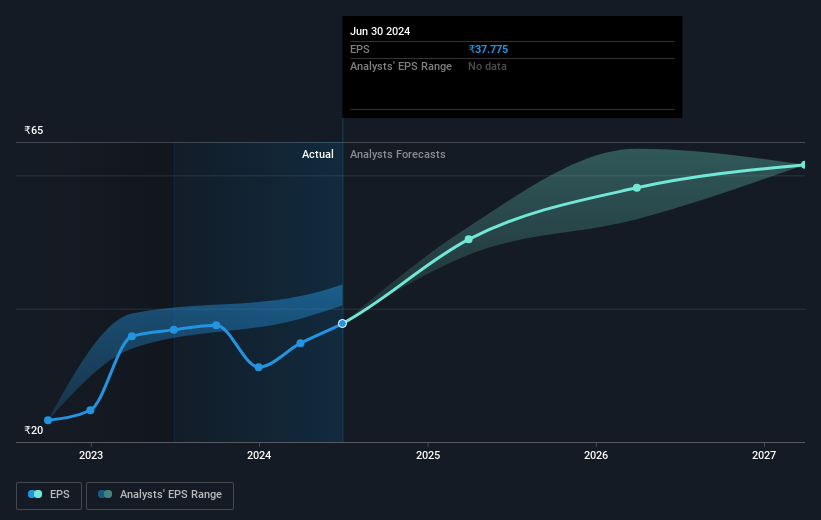GlaxoSmithKline Pharmaceuticals' (NSE:GLAXO) three-year total shareholder returns outpace the underlying earnings growth
One simple way to benefit from the stock market is to buy an index fund. But if you buy good businesses at attractive prices, your portfolio returns could exceed the average market return. Just take a look at GlaxoSmithKline Pharmaceuticals Limited (NSE:GLAXO), which is up 82%, over three years, soundly beating the market return of 57% (not including dividends).
Although GlaxoSmithKline Pharmaceuticals has shed ₹24b from its market cap this week, let's take a look at its longer term fundamental trends and see if they've driven returns.
See our latest analysis for GlaxoSmithKline Pharmaceuticals
There is no denying that markets are sometimes efficient, but prices do not always reflect underlying business performance. By comparing earnings per share (EPS) and share price changes over time, we can get a feel for how investor attitudes to a company have morphed over time.
During three years of share price growth, GlaxoSmithKline Pharmaceuticals achieved compound earnings per share growth of 20% per year. We don't think it is entirely coincidental that the EPS growth is reasonably close to the 22% average annual increase in the share price. This observation indicates that the market's attitude to the business hasn't changed all that much. Quite to the contrary, the share price has arguably reflected the EPS growth.
The company's earnings per share (over time) is depicted in the image below (click to see the exact numbers).

Dive deeper into GlaxoSmithKline Pharmaceuticals' key metrics by checking this interactive graph of GlaxoSmithKline Pharmaceuticals's earnings, revenue and cash flow.
What About Dividends?
As well as measuring the share price return, investors should also consider the total shareholder return (TSR). Whereas the share price return only reflects the change in the share price, the TSR includes the value of dividends (assuming they were reinvested) and the benefit of any discounted capital raising or spin-off. So for companies that pay a generous dividend, the TSR is often a lot higher than the share price return. We note that for GlaxoSmithKline Pharmaceuticals the TSR over the last 3 years was 100%, which is better than the share price return mentioned above. The dividends paid by the company have thusly boosted the total shareholder return.
A Different Perspective
It's nice to see that GlaxoSmithKline Pharmaceuticals shareholders have received a total shareholder return of 78% over the last year. And that does include the dividend. That's better than the annualised return of 16% over half a decade, implying that the company is doing better recently. Someone with an optimistic perspective could view the recent improvement in TSR as indicating that the business itself is getting better with time. While it is well worth considering the different impacts that market conditions can have on the share price, there are other factors that are even more important. Consider for instance, the ever-present spectre of investment risk. We've identified 1 warning sign with GlaxoSmithKline Pharmaceuticals , and understanding them should be part of your investment process.
For those who like to find winning investments this free list of undervalued companies with recent insider purchasing, could be just the ticket.
Please note, the market returns quoted in this article reflect the market weighted average returns of stocks that currently trade on Indian exchanges.
Have feedback on this article? Concerned about the content? Get in touch with us directly. Alternatively, email editorial-team (at) simplywallst.com.
This article by Simply Wall St is general in nature. We provide commentary based on historical data and analyst forecasts only using an unbiased methodology and our articles are not intended to be financial advice. It does not constitute a recommendation to buy or sell any stock, and does not take account of your objectives, or your financial situation. We aim to bring you long-term focused analysis driven by fundamental data. Note that our analysis may not factor in the latest price-sensitive company announcements or qualitative material. Simply Wall St has no position in any stocks mentioned.
 Index Options
Index Options CME Group
CME Group Nasdaq
Nasdaq Cboe
Cboe TradingView
TradingView Wall Street Journal
Wall Street Journal